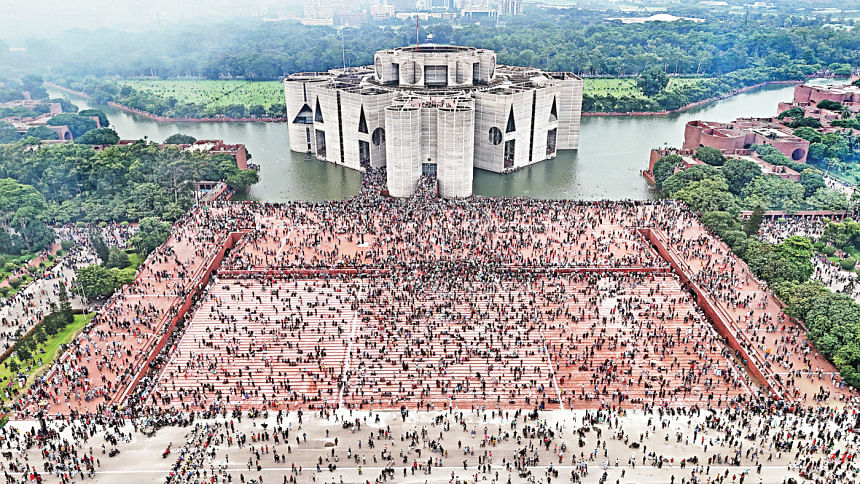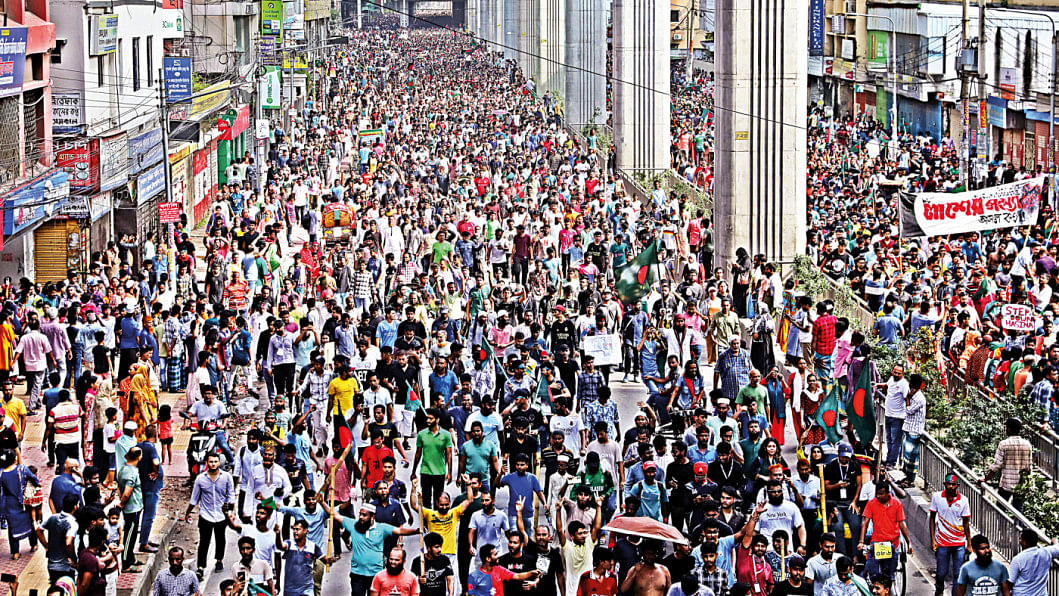Red July, one year on: The fight for unity, dignity, and justice must continue

It has been a year since Bangladesh freed itself from the murderous clutches of a tyrannical regime that had made corruption the rule of business, extreme arrogance of power the norm, and brutal repression its operational style. This was no ordinary political change but truly a creation moment etched in the blood and resolve of protesters—spearheaded by students and women, and joined by waves from all segments of the forsaken, humiliated, and mistreated citizens who had long borne the brunt of a ruling group that had lost all moral legitimacy to govern.
When the unarmed Abu Sayeed faced fascist bullets in front of his alma mater, Begum Rokeya University, on 16 July—heroically standing his ground and falling for the cause—the outcome was still very much unknown. Yet his moral fearlessness, his ultimate sacrifice, and those of many others ignited a long-dormant courage in millions of hearts and led to a turning point unlike any other twenty days later, on 36 July.
Red July calls for a new lexicon to mark change. "Monsoon Revolution" has been mentioned, but monsoon belongs to many countries. I prefer a term uniquely ours—Bangla Srabon. The rains are central to the Bangladeshi soul: a season of creative destruction and the rebirth of structures and purpose. However, as with many moments of political rupture that hold profound potential to reboot a society toward greater justice, the 'day after' has proven, and continues to prove, a much more sobering reality.
How was the uprising even possible?
Looking back, it is clear that what unfolded was a deeply significant people's uprising—a transformation that many had long hoped for, though few believed would ever truly materialise. For years, there was yearning and muted anticipation of change, but never certainty. That is where Red July marked a turning point—not only in politics, but also in how we speak about resistance and change.
The uprising revealed the extent to which an unbearable authoritarian regime had suffocated the country for over a decade and a half. People were crushed, desperate to breathe. While some continued to cheer for the regime, the overwhelming majority rejected it—not out of party allegiance, but because it violated the very ethos of Bangladesh: freedom, dignity, and the right to shape one's own future.
People aspired to fairness, merit, and a system governed by rules—not one dictated by arbitrary commands. The regime had not merely lost public trust; it had become an oppressive apparatus that generated fear, enforced silence, and caused widespread displacement. Countless young people became internal refugees, forced to flee their homes to avoid arrest or fabricated charges. The reality was grim—ghost cases, threats, extrajudicial violence.
There is a word in English: hubris—the arrogance of those in power who begin to believe they are untouchable. That arrogance blinds them. And eventually, they stumble.
Then came July, and the machinery of authoritarianism began to fracture. Youth from across the political, social, and regional spectrum stood shoulder to shoulder: females, males, students from public and private institutions, madrasa students, workers, and civil groups—and something profound shifted. Courage became contagious. When Abu Sayeed stood alone in front of Begum Rokeya University in Rangpur, was shot, and stood again, that act of defiance became a spark. People saw it, felt it—and something inside them changed.

The movement spread like wildfire. Each new wave rose as the previous one was crushed. From elite students to madrasa pupils, from neighbourhoods like Jatrabari, Uttara, and Savar to remote towns—ordinary people began to rise. Workers, housewives, students—everyone took to the streets. By August, this people's movement had become unstoppable. Despite intensified repression, the momentum only grew.
It was not a revolution in the classical sense, but a mass uprising driven by public will and fearless solidarity. Political parties responded, but the movement's core identity remained popular and collective.
One year later, we must reflect on the depth of that moment. First, the collective rejection of authoritarianism was in itself a major achievement—a shared, universal cry for change. Second, the people's hopes extended far beyond the removal of a regime. They longed for a society that is fair, rights-based, and grounded in merit—not one based on charity or handouts, but one that allows them to thrive. The people of Bangladesh have always shaped their own destiny—they simply require the conditions to do so.
One year after Red July: where do we stand?
A year has passed since the fall of the entrenched authoritarian regime—an achievement that must be remembered not only as a political event, but as a profound psychological and philosophical shift. Remembering it gives us courage and reminds us of the power of unity.
Yet rather than moving forward in the spirit of collective construction, we now witness fragmentation. Competing claims over who deserves credit for last year's victory have replaced the broader sense of solidarity. This mirrors past mistakes—such as the infighting over credit for the 1971 Liberation War—which ultimately weakened national unity.
Despite these divisions, the public continues to overwhelmingly reject authoritarianism and seeks a more inclusive and accountable state. However, real improvements in daily life—better governance, fewer false cases, less corruption—remain elusive.
One of the biggest structural obstacles is the unreformed bureaucratic machinery steeped in colonial heritage. Instead of addressing this, the interim government has empowered bureaucratic rule. While economic stability has slightly improved, everyday hardships have worsened.
The youth—central to the July movement—have shown both promise and vulnerability. While many still dream of transformative change, others have become absorbed into the same corrupt structures they once opposed. That paradox should concern us all.
As we reflect, the message is unmistakable: The struggle is far from over. We must safeguard the spirit of July, rebuild solidarity, and confront the difficult questions ahead—together.
Hossain Zillur Rahman is the executive chairman of Power and Participation Research Centre and a former adviser to the Caretaker Government.

 For all latest news, follow The Daily Star's Google News channel.
For all latest news, follow The Daily Star's Google News channel. 



Comments